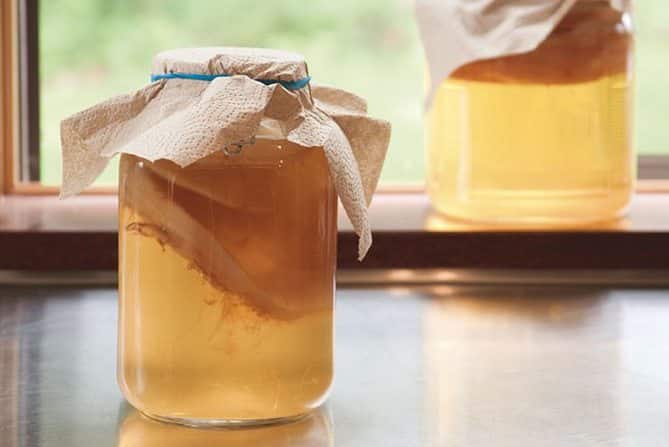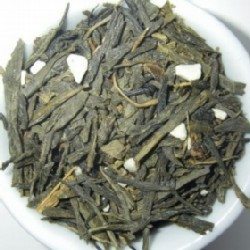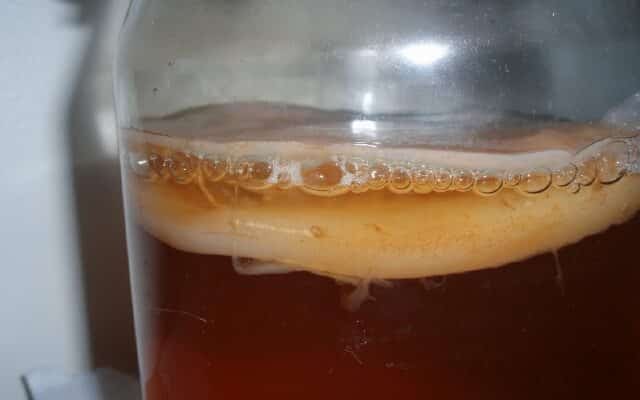What Are The (Real) Health Benefits Of Kombucha?
Here’s what kombucha tea is: a healthy drink that boosts your immune system, helps keep your digestive system in order, promotes the free circulation of blood and lymph, adds essential nutrients to your diet, and in general makes nearly everything in your body run more smoothly and evenly.
Here’s what kombucha tea is not: a magic cure-all that will solve all your problems.
The Culture of Commercialization
Although kombucha has been brewed by people for personal home use, medical treatments, and simple refreshment for thousands of years, it’s only in the last few decades that it has become a commercial success that is responsible for moving money out of the pockets of consumers and into the bank accounts of large and small corporations. This isn’t all bad, of course! It’s such a healthy drink, with so many benefits, that the more people who know about kombucha the better.
The down side of commercialization is that it comes with, well, commercialization. That means some people who make kombucha will try to “hype” the product to increase sales. Keep that in mind when you’re looking to buy anything that seems to be health-promoting, and you’ll become a better consumer. For example, think of the gluten-free craze that has led to putting “gluten free!” stickers on everything from bags of spinach to bottles of olive oil (neither of which have ever contained gluten, by the way). While there are people with celiac disease who have potentially life-threatening reactions to gluten, and who need to avoid even trace amounts found in the production of foods, there’s really no way for gluten to get into a bag of spinach under normal circumstances. The only reason that sticker is there is so that you’ll associate spinach with the latest health trend, and will be more willing to buy it.
With that said, there are definite health benefits associated with drinking kombucha tea, and there’s no reason you should avoid it just because your friend’s neighbor said her brother-in-law’s uncle grew all his hair back after drinking kombucha, or any other claim that you find to be a little hard to believe. There are many things that are true about the effects of regular kombucha consumption.
The Health Benefits of Kombucha
Kombucha is an acidic drink – though not so acidic that it isn’t delicious! – and works like lemon juice to balance the body’s pH. It also helps detoxify the system, especially the liver, and some people report that they experience an increased metabolism, which helps with weight loss and energy.
Note though, there are still no major conclusive studies that prove Kombucha to be some sort of super drink (as the hype claims). So as far as ‘science’ goes, the jury is still out on what exactly Kombucha does to the human body — the benefits and the cons.
However, there’s quite a bit of anecdotal evidence that Kombucha brings health benefits if consumed regularly.
The Proven Health Benefits
Probiotics: Likely, the biggest health benefit is that Kombucha is full of probiotics (healthy bacteria) that help balance and regulate the digestive system. There have been numerous studies show that probiotics can have seriously positive effects on your digestion and overall health.
People who drink kombucha generally report that they have fewer problems with things like upset stomachs, ulcers, flatulence, diarrhea, and constipation.
Kombucha also contains antioxidants that boost your immune system. Instead of buying those expensive vitamin C powders when cold and flu season come around, try drinking a glass of kombucha every morning instead.
Brewing kombucha at home is simple and inexpensive, as you’ll find out when you read this article.
Contains B Vitamins: Kombucha is full of essential B vitamins, which are crucial to health even before birth. Significant levels of these nutrients have been measured in several studies, including this one.
- Folic acid (also called folate or vitamin B9) helps prevent the birth defect called spina bifida.
- Vitamins B6 and B12 help prevent atherosclerosis (hardening of the arteries).
- Vitamin B2 can reduce the symptoms of migraines.
- Vitamin B3 helps build strong tissues in the body.
- Vitamin B1 is essential for metabolizing fat and protein.
Detoxification: studies show Kombucha contains glucuronic acid which may help the body detoxify some harmful compounds. The evidence is there that this might occur but it has not been specifically tested in humans.
The ‘detoxifying’ properties of kombucha refer to the ability of some acids produced during the fermentation process to increase glucuronidation in the human body, which is involved in eliminating some drugs and xenobiotics from the body by conjugating them – examine.com
The Unproven Health Benefits (that just might be true…)
Here are some of the other benefits Kombucha MAY bring, though these have not been specifically proven by scientific studies. However, there is some evidence linking Kombucha to these claims. On an anecdotal level, people claims these.
Improve Immune System Response: The active yeasts in kombucha help your body fight off infections from invasive yeasts and parasites.
Blood Sugar Regulation: Regular consumption of kombucha helps you keep your blood sugar in balance.
Improve Organ health: Kombucha has been linked to a reduced risk of liver disease and kidney stones.
Antibacterial Properties: Kombucha has antibacterial properties and can be used topically to cleanse the skin and heal wounds. For other ways to take advantage of kombucha’s healing properties, try some of the suggestions in this article.
The Over-Hyped Health Benefits (that are probably false)
All manner of health benefits are hyped about Kombucha from curing cancer, staving off age, weight loss to even preventing hair loss. However, these wild claims have never been proven and are unlikely true.
Our Take on The Benefits of Komucha
The truth is that Kombucha probably does bring benefits to digestion and the immune system through the priobiotics; the beneficial acidic and sugar compounds created by the SCOBY may also may have a positive effect on helping reduce toxic compounds in the body, effectively helping out the liver.
From an alternative health perspective, kombucha reduces illness by reducing any imbalances in the body. Chinese traditional medicine has turned to kombucha for centuries as a way to balance the body’s chi (qi) and to regulate the interplay between a person’s yin and yang forces. Kombucha’s detoxifying effect helps the body return to its normal state, giving it the ability to naturally fight off health problems. And that’s the most important role of kombucha in the diet: to help eliminate the internal problems associated with imbalance, so that your body isn’t fighting itself instead of fighting off disease.
We’ve looked at enough anecdotal evidence (not to mention that we are avid drinkers ourselves and do feel and see real benefits to drinking it) to say there is definitely something behind many of the health claims. Not all the claims are real, but Kombucha does work and we do recommend people drink it. But don’t expect anything magical.
Potential health benefits aside, Kombucha is an absolutely delicious drink and fun to brew. So why not drink it?
Components of Kombucha
Two of the main components of kombucha that play key roles in this healing and balance are lactic acid and acetic acid. These acids, which you’ll taste when you sip a glass of kombucha, help regulate the body’s pH, enhance liver function, improve digestion, and fight off bacteria in the system. There are other detoxifying and health-promoting compounds in kombucha, not all of which have been identified by science. In addition, since each batch of kombucha tea is slightly different, the amounts of each will vary (although not by much). Here are some of the other organic acids that researchers have measured in kombucha:
- citric acid (antioxidant)
- glucuronic acid (source of glucosamines)
- gluconic acid (strengthens cell walls)
- malic acid (detoxifies the liver)
- butyric acid (fights bad yeasts)
Lactic acid is essential for the proper functioning of your immune system, and is associated with increased antimicrobial activity. Lactic acid bacteria make up between 20-30% of a typical SCOBY (the Symbiotic Colony Of Bacteria and Yeast that feeds on sweet black teat to create kombucha). According to researchers at Vietnam National University, the more lactic acid present in kombucha, the more effective it is. The researchers studied the ways that lactic acid promotes the production of other health-enhancing aspects of kombucha, including an increase in antioxidant and antibacterial function. (You can read the full study here. )
Kombucha and Weight
Whether you want to lose weight or gain weight, there are companies who would be all too happy to take your money in exchange for a box of diet food, a bottle of pills, or a case of protein drinks. You may benefit from kombucha for both weight loss and (healthy) weight gain, because of the way it helps suppress the appetite and regulate the digestive system.
In and of itself, kombucha is nutritious. It’s rich in vitamins and minerals, and if you brew it yourself, you know that you’re getting something that has no artificial chemicals in it. The pesticides and herbicides used in much of modern agriculture are increasingly linked to serious health problems with world-wide effects. What’s more, that same modern agriculture, while giving us strawberries and tomatoes in January, has over-processed even fresh fruits and vegetables so that they have a fraction of the nutrients that they did fifty years ago. As part of your healthy diet, try to get fresh, organic fruits and vegetables, and drink kombucha to help replace some of the vitamins that you’re not getting from the produce at the grocery store. For complete instructions on brewing your own kombucha, read this article.
The environmental pollution – both in the produce and in the air and soil – doesn’t just create a vitamin deficiency. It also leads to whole-body problems due to repeated and constant exposure to environmental toxins. As a balancing and healing agent, kombucha helps with that as well. The vitamin C in kombucha is one of the things that makes it such a powerful detoxifying liquid.
For people who want to gain healthy weight and muscle mass, kombucha can help. According to several studies, a diet that included kombucha made a noticeable difference in the growth rate of chickens being raised for meat. The researchers concluded that the kombucha increased the digestibility of the proteins in the feed, and that helped them process their food more efficiently. In and of itself, kombucha also has protein, fiber, and calcium, all of which help build bone and muscle. The studies also found that a SCOBY is rich in the essential amino acid lysine, which plays a major role both in building muscle mass and in recovering from injuries. It’s not a surprise, then, that many successful athletes turn to kombucha instead of sports drinks. (You can read one of the muscle mass studies here)
Antimicrobial and Antibacterial Properties of Kombucha
According to a study done at Cornell University, kombucha has a significant antimicrobial component that makes it an effective antibacterial agent. The production of cellulose by the A. xylinum yeast that forms part of every kombucha SCOBY are also very useful in the treatment of wounds, and can promote healing internally and externally.
A later study done in Japan also showed that harmful bacteria in the digestive system were reduced, and helpful bacterial strains like bifidobacterium were enhanced, when people drank kombucha regularly. Lactic acid, like acidophilus, helps keep the intestines healthy and functioning normally, and helps with the process of digestion and elimination. Because the natural bacterias in the gut decrease in number as a person ages, kombucha may be helpful in fighting off the effects of getting older.
Side Effects of Kombucha
One caution: before you start drinking kombucha, you need to remember that something with such a powerful and long-lasting positive effect on your body will often have some negative effects as well. Fortunately, these side effects are usually not very significant, and go away quickly as your body starts to get into balance.
If you’ve decided to start making and drinking kombucha after spending several years (or decades) eating a diet high in fat, excess sugar, too much protein, and not enough fresh fruits and vegetables, don’t be surprised if your body says, “Whoa – wait a minute!” You’re going to be putting your system through a radical change, and you need to take it slowly at first.
Most people don’t get enough probiotics in their foods, and a sudden increase in probiotics – which help digestion – will also often lead to a sudden increase in … digestion. In other words, if you start drinking kombucha, you might start having diarrhea. You can reduce this by only taking a few sips at first, and gradually building up to a glass or more every day. As your body’s digestive system returns to its normal healthy balanced state, you’ll find that you don’t have this problem any more.
One of the other reasons why you might have some uncomfortable moments at first is that kombucha is also acting as a detoxifying agent, so your body is getting rid of its accumulated toxins, and that’s not a pleasant process. In addition to digestive issues, you might also experience headaches, fatigue, nausea, or other symptoms.
Don’t worry! These are all symptoms of a temporary “kombucha flu” and will go away. Drink lots of water to help your system flush the toxins and help keep you from getting dehydrated. Again, if you find that you’re feeling worse instead of better, and this feeling lasts more than a day or two, cut back on the amount of kombucha you’re drinking, or even stop drinking it for a few days.
NOTE: If you’re drinking kombucha that you’re brewing yourself, make sure that you’re brewing something that’s completely safe to drink. While the brewing process is fairly foolproof, there are things that can introduce harmful bacteria or mold into the kombucha tea. Make sure you’re brewing high-quality kombucha by reading the information in this article.
There have been a number of negative effects associated with drinking Kombucha — most of these likely caused by improper brewing. It should be noted that there is some risk when you brew your own Kombucha. It can be toxic if things go wrong. So make sure you properly sanitize your equipment before and after brewing and watch for any sort of mold growing on your SCOBY. If proper care is taken when brewing Kombucha, the risks are minimal.
The Final Word
With a supply of freshly-made kombucha always in your kitchen, you’ll feel better than if you’d stocked your bathroom shelves with mass-produced and artificial nutritional supplements. Kombucha tea is a remedy you can turn to when you’re feeling out of shape, out of sorts, or out of balance. Keep your body in its best working order with the immune-boosting and infection-fighting properties of homemade kombucha, and you’ll feel better now, and into the future.









